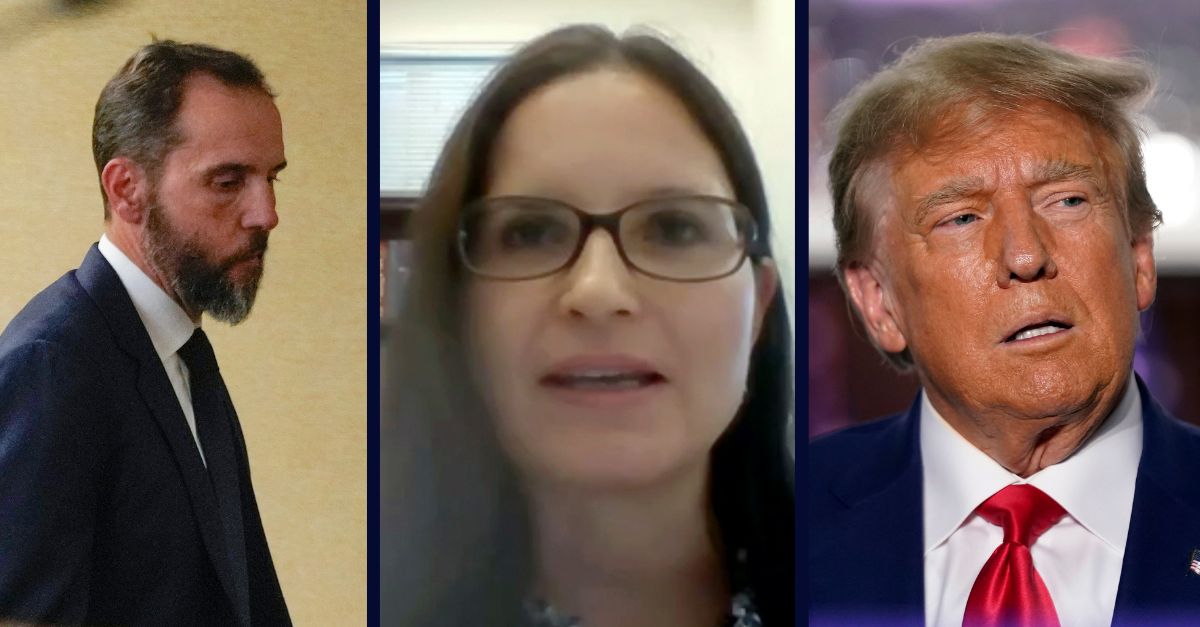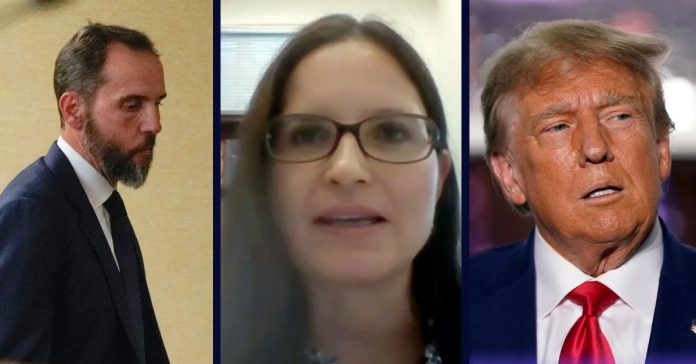
Left to right: Special counsel Jack Smith arrives to speak about an indictment of former President Donald Trump, Aug. 2023. (AP Photo/Jacquelyn Martin)/U.S. District Judge Aileen Cannon during remote Senate Judiciary Committee nomination hearing. (U.S. Senate via AP)/Former President Donald Trump speaks at Trump National Golf Club in Bedminster, N.J. June 2023. (AP Photo/Andrew Harnik, File)
“Unconstitutional vagueness,” “Q clearance,” the National Archives’ criminal referral, and the Presidential Records Act figure to feature prominently at a Thursday morning hearing in the Mar-a-Lago case, when Donald Trump’s lawyers will argue for and the Special Counsel’s Office will argue against the dismissal of the Espionage Act indictment.
What to expect and when
U.S. District Judge Aileen Cannon, who earlier the week granted the defense more time to respond to special counsel Jack’s Smith pretrial motions dealing with discovery and the “scope of the prosecution team,” put the parties on notice that they should be prepared to reserve a “full day for argument,” starting at 10 a.m. on Thursday.
Arguments will pertain to Trump’s motion to dismiss based on “unconstitutional vagueness” and Trump’s/co-defendant valet Walt Nauta’s motion to dismiss to case based on the Presidential Records Act.
The Espionage Act
Last Thursday, Smith opposed Trump’s “unconstitutional vagueness” challenge of the indictment both generally and specifically as to count 19.
In their February motion to dismiss on grounds of unconstitutional vagueness, Trump lawyers argued the nineteenth willful retention of national defense information count, relating to an “Undated document concerning nuclear weaponry of the United States,” could not stand. They said the special counsel handed them Department of Energy records “indicating that President Trump maintained the ‘Q’ clearance that is relevant to the document charged.”
In his opposition, Smith called the “Q clearance” argument meritless because discovery actually shows the “Q clearance” went away “as a matter of law” when Joe Biden was inaugurated as president.
Beyond this, Smith emphasized there’s “no legal basis to dismiss” the count because “even if Trump possessed a Q clearance at any time after his Presidency (which he did not), that would still not entitle him to possess the document charged in Count 19 at Mar-a- Lago” or obstruct a federal probe.
While this issue seems likely come up in court, the Trump team’s broader assertion on the Espionage Act charges are a certainty.
The defense has maintained that the willful retention charges are “unconstitutionally vague as applied to President Trump—a former President operating within the framework of the Presidential Records Act (‘PRA’), who (1) acted as the ultimate Original Classification Authority based on Article II of the Constitution and under Executive Order 13526, (2) has recourse to the executive privilege, and (3) is entitled to immunity for his official acts.”
The Presidential Records Act
Speaking of the Presidential Records Act, Smith last Thursday also responded to arguments made by Trump’s defense (and supplemented by former Trump White House senior advisor Stephen Miller’s legal group America First Legal Foundation), calling Trump’s reliance on the PRA to dismiss “wrong.”
This, too, will certainly come up at the hearing.
In its motion to dismiss, the defense boldly argued that the PRA gave Trump “virtually unreviewable Article II executive authority to designate the records as personal when, as alleged in the Superseding Indictment, he ’caused’ the materials to be transported out of the White House while he was still in office.”
Smith has countered by saying Trump simply had no such unilateral authority under the PRA.
“The PRA does not exempt Trump from the criminal law, entitle him to unilaterally declare highly classified presidential records to be personal records, or shield him from criminal investigations—let alone allow him to obstruct a federal investigation with impunity,” the special counsel said, before turning his attention to claims that amicus curiae America First Legal (AFL) made about the National Archives (NARA).
What about the National Archives?
Recall that AFL successfully sought to enter the case as a friend of the court with claims that NARA committed an “unlawful abuse of executive authority” and violated the Administrative Procedure Act by failing through its criminal referral to the DOJ.
“NARA’s failure to provide advance warning of its claimed referral authority or to outline the parameters of the conduct that would trigger this authority means that the indictment should be dismissed,” AFL argued.
Smith has since responded that the defense and its allies are “fundamentally wrong” on this point:
Finally, Trump contends that NARA made an improper referral to DOJ on February 9, 2022, and that the FBI therefore had no basis to “predicate” an investigation of his unauthorized possession of classified government documents. He claims that, as a result, the obstruction and false-statement allegations in Counts 33-42 must be dismissed. Each aspect of that argument is fundamentally wrong. Nothing in the PRA preempts the application of federal criminal law or divests the Government of criminal investigative authorities, and in any event, an individual’s claim that the Government lacked authority to investigate provides no defense to charges for obstructing its investigation.
Court watchers will, as usual, be looking for any hints or tells as to how Cannon is leaning on the issues and whether or how much the pro-Trump amici’s arguments inform the judge’s thinking.
When she accepted AFL’s brief and a second brief of note, the judge said those “may be of considerable help to the Court in resolving the cited pretrial motions.”
Have a tip we should know? [email protected]

